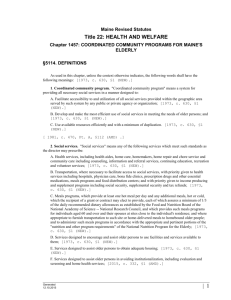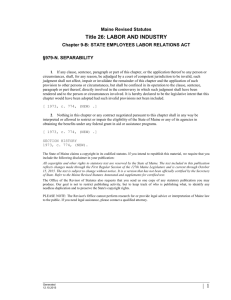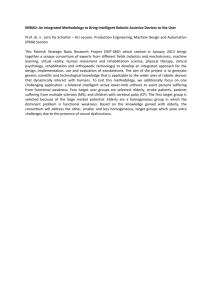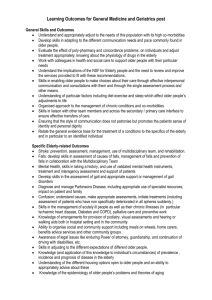5102 MS-Word - Maine Legislature
advertisement
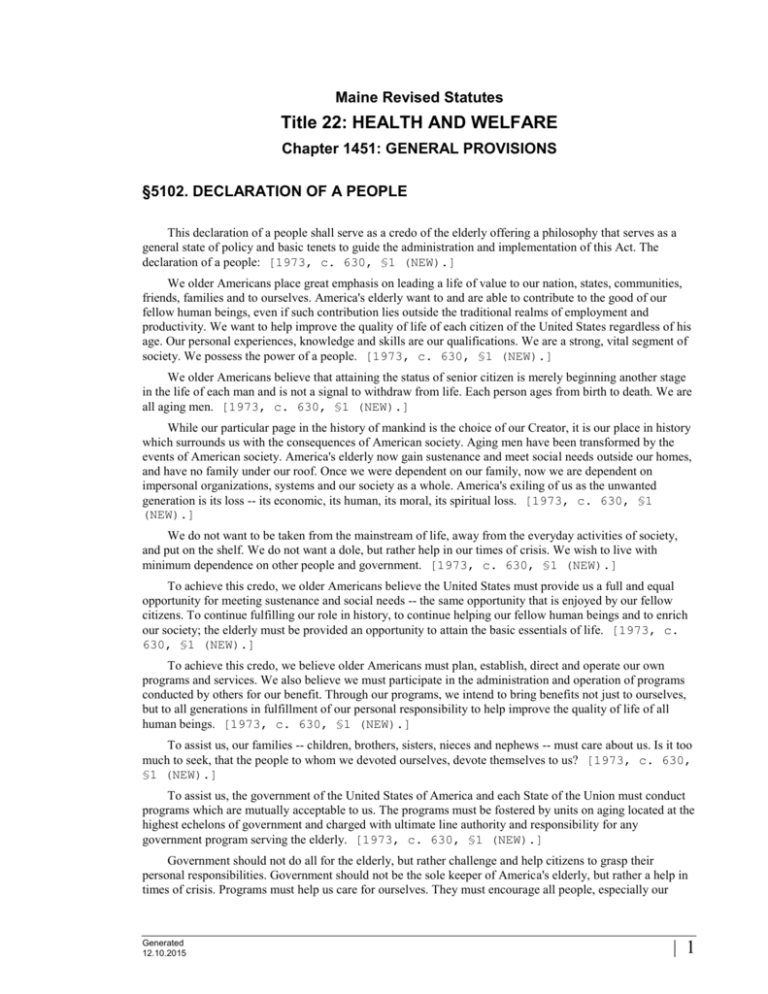
Maine Revised Statutes Title 22: HEALTH AND WELFARE Chapter 1451: GENERAL PROVISIONS §5102. DECLARATION OF A PEOPLE This declaration of a people shall serve as a credo of the elderly offering a philosophy that serves as a general state of policy and basic tenets to guide the administration and implementation of this Act. The declaration of a people: [1973, c. 630, §1 (NEW).] We older Americans place great emphasis on leading a life of value to our nation, states, communities, friends, families and to ourselves. America's elderly want to and are able to contribute to the good of our fellow human beings, even if such contribution lies outside the traditional realms of employment and productivity. We want to help improve the quality of life of each citizen of the United States regardless of his age. Our personal experiences, knowledge and skills are our qualifications. We are a strong, vital segment of society. We possess the power of a people. [1973, c. 630, §1 (NEW).] We older Americans believe that attaining the status of senior citizen is merely beginning another stage in the life of each man and is not a signal to withdraw from life. Each person ages from birth to death. We are all aging men. [1973, c. 630, §1 (NEW).] While our particular page in the history of mankind is the choice of our Creator, it is our place in history which surrounds us with the consequences of American society. Aging men have been transformed by the events of American society. America's elderly now gain sustenance and meet social needs outside our homes, and have no family under our roof. Once we were dependent on our family, now we are dependent on impersonal organizations, systems and our society as a whole. America's exiling of us as the unwanted generation is its loss -- its economic, its human, its moral, its spiritual loss. [1973, c. 630, §1 (NEW).] We do not want to be taken from the mainstream of life, away from the everyday activities of society, and put on the shelf. We do not want a dole, but rather help in our times of crisis. We wish to live with minimum dependence on other people and government. [1973, c. 630, §1 (NEW).] To achieve this credo, we older Americans believe the United States must provide us a full and equal opportunity for meeting sustenance and social needs -- the same opportunity that is enjoyed by our fellow citizens. To continue fulfilling our role in history, to continue helping our fellow human beings and to enrich our society; the elderly must be provided an opportunity to attain the basic essentials of life. [1973, c. 630, §1 (NEW).] To achieve this credo, we believe older Americans must plan, establish, direct and operate our own programs and services. We also believe we must participate in the administration and operation of programs conducted by others for our benefit. Through our programs, we intend to bring benefits not just to ourselves, but to all generations in fulfillment of our personal responsibility to help improve the quality of life of all human beings. [1973, c. 630, §1 (NEW).] To assist us, our families -- children, brothers, sisters, nieces and nephews -- must care about us. Is it too much to seek, that the people to whom we devoted ourselves, devote themselves to us? [1973, c. 630, §1 (NEW).] To assist us, the government of the United States of America and each State of the Union must conduct programs which are mutually acceptable to us. The programs must be fostered by units on aging located at the highest echelons of government and charged with ultimate line authority and responsibility for any government program serving the elderly. [1973, c. 630, §1 (NEW).] Government should not do all for the elderly, but rather challenge and help citizens to grasp their personal responsibilities. Government should not be the sole keeper of America's elderly, but rather a help in times of crisis. Programs must help us care for ourselves. They must encourage all people, especially our Generated 12.10.2015 | 1 MRS Title 22 §5102. DECLARATION OF A PEOPLE families to care about us. Programs must provide a strong advocacy of America's elderly, unencumbered by the restrictions of partisan politics and the pressures of special interests, except those interests inherent to this credo of the elderly. [1973, c. 630, §1 (NEW).] Programs we operate must be distinct and clearly identified as intended to benefit older people, or be identified as the elderly's way of helping mankind. Government programs benefiting America's elderly must be distinct and visibly separate from other government services. This distinctness must be maintained in legislation, sources of funds and generally in operation of programs and services. We believe our policy provides that programs serving older people may be integrated with programs serving broader populations in those instances where gross duplication of identical programs would otherwise result. We also believe that programs with features specifically needed by older people must not be integrated with programs serving broader populations -- even though the programs may be similar -- except where it is conclusively demonstrated that such specific features will be retained or that greater benefits will accrue to the elderly from the integration of programs. [1973, c. 630, §1 (NEW).] First, older people must receive income adequate to obtain the basic essentials of life from the market place, like our fellow Americans; rather than be given income supplement programs, such as food stamps, Old Age Assistance, subsidized housing and property tax relief. Secondly, the elderly with a time of crisis because of age, physical condition or social status must be assisted by appropriations providing services directly to them, such as homemakers, meals on wheels, home health care and nursing homes. [1973, c. 630, §1 (NEW).] AMERICA MUST CONSIDER AND DECIDE HOW TO ACHIEVE PURPOSEFUL, PRIMARY GOALS TO GIVE AGING MEN THE OPPORTUNITY OF RETURNING TO A FULLER EXISTENCE OR AMERICA SHALL CONTINUE TO RELEGATE AGING MEN TO THE BACK DOOR STOOP OF HISTORY WHERE WE WILL SLIDE INVISIBLY AND UNNOTICED INTO EXTINCTION. THE LAST CHOICE IS NOT ACCEPTABLE. [1973, c. 630, §1 (NEW).] Responsibility for achieving this credo rests on the shoulders of all Americans, but especially our own. We shall attain a life of greater value if each American accepts his personal responsibility for his fellow human beings. We shall reestablish our role in society by operating services to help all generations. We shall resurrect our independence by redirecting the country's resources. [1973, c. 630, §1 (NEW).] We shall express the status of our survival to all Americans. We shall carry our call to all the sources of help, to all the seats of power. We shall wield our power as a people. Through our own groups, we shall shatter the bondage of our geriatric shackles. [1973, c. 630, §1 (NEW).] As older Americans, we grasp the gauntlet of this credo. We pledge ourselves to it. We shall achieve it. We accept the credo's challenge, not with the intent of personal gain, but rather remembering that, what we achieve today will benefit those who follow, for we will soon be gone. [1973, c. 630, §1 (NEW).] SECTION HISTORY 1973, c. 630, §1 (NEW). The State of Maine claims a copyright in its codified statutes. If you intend to republish this material, we require that you include the following disclaimer in your publication: All copyrights and other rights to statutory text are reserved by the State of Maine. The text included in this publication reflects changes made through the First Regular Session of the 127th Maine Legislature and is current through October 15, 2015. The text is subject to change without notice. It is a version that has not been officially certified by the Secretary of State. Refer to the Maine Revised Statutes Annotated and supplements for certified text. The Office of the Revisor of Statutes also requests that you send us one copy of any statutory publication you may produce. Our goal is not to restrict publishing activity, but to keep track of who is publishing what, to identify any needless duplication and to preserve the State's copyright rights. PLEASE NOTE: The Revisor's Office cannot perform research for or provide legal advice or interpretation of Maine law to the public. If you need legal assistance, please contact a qualified attorney. | 2 Generated 12.10.2015
